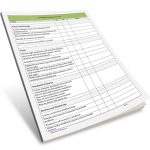The article discusses the importance of a Corrective and Preventive Action (CAPA) system within a quality management system (QMS), particularly for organizations needing to comply with FDA regulations and ISO standards. A CAPA process is crucial for analyzing customer complaints and non-conformances to identify and implement corrective and preventive actions. Corrective action … [Read more...] about Deciding Which Events to Escalate Into a CAPA System
risk management
A Primer on Cyber Insurance and the Use of Models
The article traces the history and evolution of cybercrime, from the world's first alleged cybercrime in 1834, when attackers hacked the telegraph system in France, to the modern-day surge in cyberattacks since the 2010s. Despite the overshadowing of cyber risks by other global concerns in the 2022 World Economic Forum's annual risk tabulation, cyber threats remain a … [Read more...] about A Primer on Cyber Insurance and the Use of Models
How to Build and Maintain a Risk Register
A risk register is a vital tool for organizations, serving as an information repository to document the various risks they face and the measures taken to address them. The article emphasizes the increasing probability, severity, and innovation of cyber-attacks and the challenges many organizations face in integrating cybersecurity risk into their enterprise risk management … [Read more...] about How to Build and Maintain a Risk Register
Risk-Based Thinking: An Essential Part of ISO 9001
The article delves into the significance of risk-based thinking in the ISO 9001:2015 Quality Management System (QMS) standard. One of the primary concepts introduced in this standard is the systematic approach to considering and addressing risks and opportunities as an essential component of the quality management system. This approach contrasts with the previous version, ISO … [Read more...] about Risk-Based Thinking: An Essential Part of ISO 9001
Risk-Based Thinking and the IATF 16949 Requirements Related to Risk
Risk-based thinking is one of the more significant additions to ISO 9001:2015's list of quality management principles. Risk-based thinking involves incorporating risk analysis in an organizational quality management system, including certain risks' opportunities, probability, and consequences. The goal is to prevent identifiable problems before they happen, evaluating risks … [Read more...] about Risk-Based Thinking and the IATF 16949 Requirements Related to Risk
Closed loop supply chains 4.0: From risks to benefits through advanced technologies. A literature review and research agenda
Industry 4.0, focusing on more interconnective digital technology, has shown promising benefits for manufacturers and supply chains. Specifically, Industry 4.0 technologies could mitigate risks involving closed-loop supply chains, in which organizations rework their waste into new goods or products. This paper outlines two extensive reviews of the current operational risks with … [Read more...] about Closed loop supply chains 4.0: From risks to benefits through advanced technologies. A literature review and research agenda
Quality vs. Inflation and the Deficit
Quality professionals may have more tools to address inflation than previously believed, specifically by removing waste within their organizations. For manufacturers, eliminating waste from supply chains can lower prices, raise wages, and boost profits since waste contributes to inflation. Waste begets poorer quality as organizations spend more on unproductive labor, energy, … [Read more...] about Quality vs. Inflation and the Deficit
OHS Research Needs to Focus on Why Incidents Don’t Happen
When it comes to understanding the safety of workplaces, traditional questioning in occupational health and safety research may not suffice. Investigations in occupational health and safety usually only focus on incidents that occur, but disregard what keeps them from happening. Ron Gantt says that hazards aren’t just thrown into the workplace. He’s a director at the … [Read more...] about OHS Research Needs to Focus on Why Incidents Don’t Happen
Risk Management Rarely Gets to the Root Cause
Large corporations typically have internal risk management functions. Many are staffed by individuals with advanced degrees—even Ph.D.s—in areas such as mathematics, statistics, actuarial science, etc. The role of these folks is to identify areas of financial risk and forestall or reduce the threat they pose to their employer’s profitability. Supply chain risk is evaluated and … [Read more...] about Risk Management Rarely Gets to the Root Cause
Business Continuity Planning Suite
If you need more help getting a business or organization prepared, please use the new Business Continuity Planning Suite (ZIP Archive - 13 Mb: PC Compatible) developed by DHS’ National Protection and Programs Directorate and FEMA. This software was created for any business with the need to create, improve, or update its business continuity plan. The Suite is … [Read more...] about Business Continuity Planning Suite
A Guide to Quality Risk Management
The main aim of any risk management plan is to make an adverse event less likely to be fatal to your business and reduce the damage done by similar threats when they happen again. All organizations should use risk identification, assessment and management to capitalize on their strengths and evaluate weaknesses. Similarly, quality management is a process that ensures your … [Read more...] about A Guide to Quality Risk Management
ISO 31000:2018 – Risk management
ISO 31000:2018(en)Risk management — Guidelines Organizations of all types and sizes face external and internal factors and influences that make it uncertain whether they will achieve their objectives. Managing risk is iterative and assists organizations in setting strategy, achieving objectives and making informed decisions. Managing risk is part of governance and … [Read more...] about ISO 31000:2018 – Risk management
Definition: High Reliability Organization (HRO)
What is an HRO? Research by a variety of experts, including Karl Weick, Kathleen Sutcliffe, and Karleen Roberts amongst others has driven the evolution of our understanding over 3 decades. Here is a current definition to work from: A High Reliability Organization (HRO) functions with systems and people in place that are exceptionally consistent in accomplishing … [Read more...] about Definition: High Reliability Organization (HRO)
ISO 31000:2018-Risk Management: A Practical Guide
Every organization faces risks that could impact its objectives. Organizations that have identified risks and committed to the effective management of those risks will be better prepared to deal with them. This handbook, published jointly by ISO and UNIDO, provides valuable insights into the implementation of ISO 31000 Risk management – Guidelines. Read the full article … [Read more...] about ISO 31000:2018-Risk Management: A Practical Guide
How Small Manufacturers Can Develop Risk Management Strategies for Supply Chains
The COVID-19 pandemic brought to light a stark reality about current supply chains. As Nissan Motor Co.’s Chief Operating Officer Ashwani Gupta points out, “The just-in-time model is designed for supply-chain efficiencies and economies of scale. The repercussions of an unprecedented crisis like COVID highlight the fragility of our supply-chain model.” The U.S. supply chain … [Read more...] about How Small Manufacturers Can Develop Risk Management Strategies for Supply Chains
Risk-Based Thinking (RBT) in ISO 9001:2015
Risk-based thinking is an approach to managing quality that focuses on identifying potential problems before they occur. It involves taking a systematic look at how products or services are produced and then considering what could go wrong and what steps can be taken to reduce the likelihood of this happening. By implementing risk-based thinking into your Quality Management … [Read more...] about Risk-Based Thinking (RBT) in ISO 9001:2015
Quality Control and Quality Assurance: What’s the Difference?
Many people get confused about what constitutes quality control (QC) and quality assurance (QA). It’s important to understand the differences and how they both play vital but distinct roles in helping an enterprise achieve the highest quality standards. QA and QC work together as part of an overall quality management system (QMS) and both are essential for achieving and … [Read more...] about Quality Control and Quality Assurance: What’s the Difference?

















